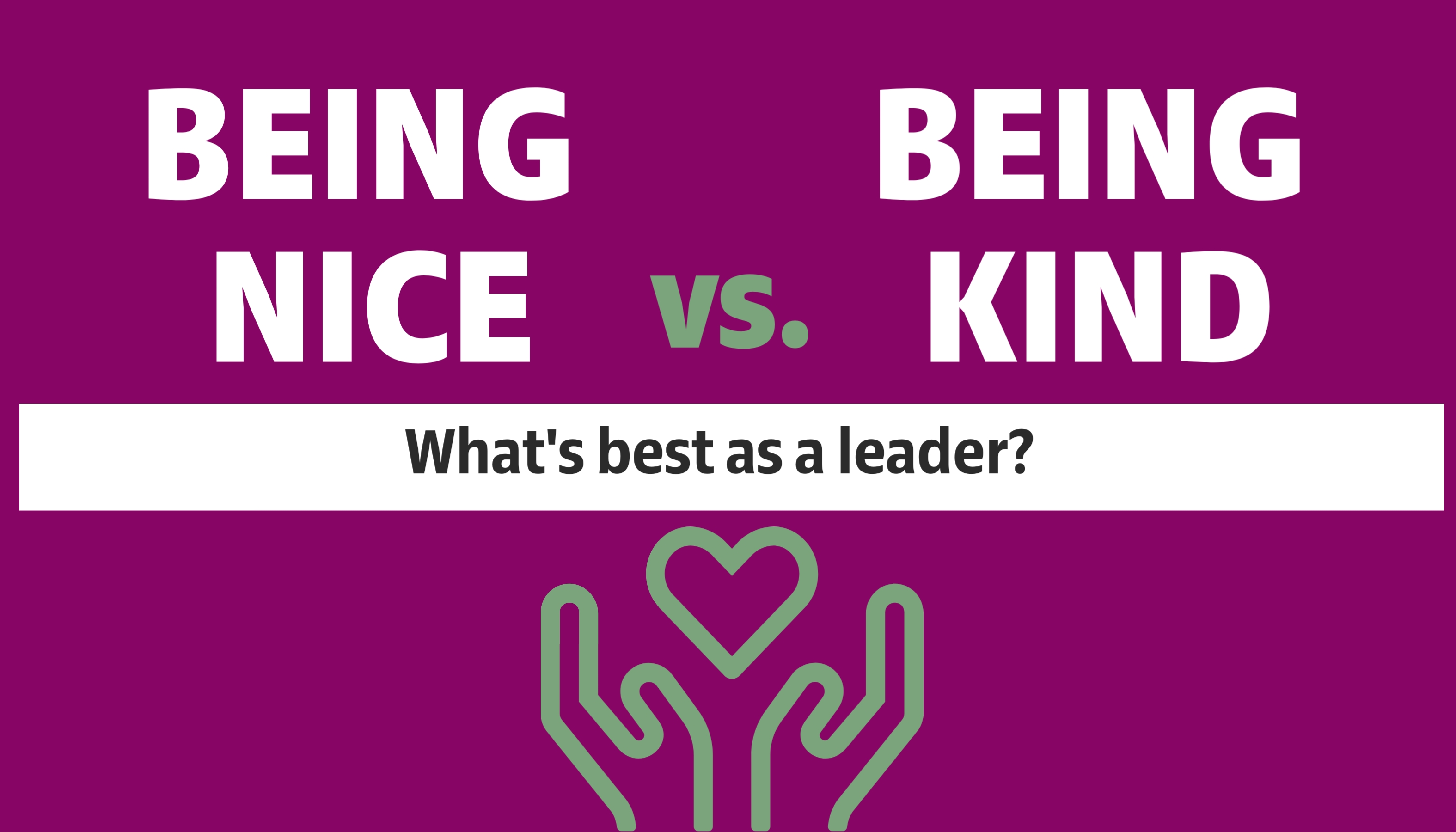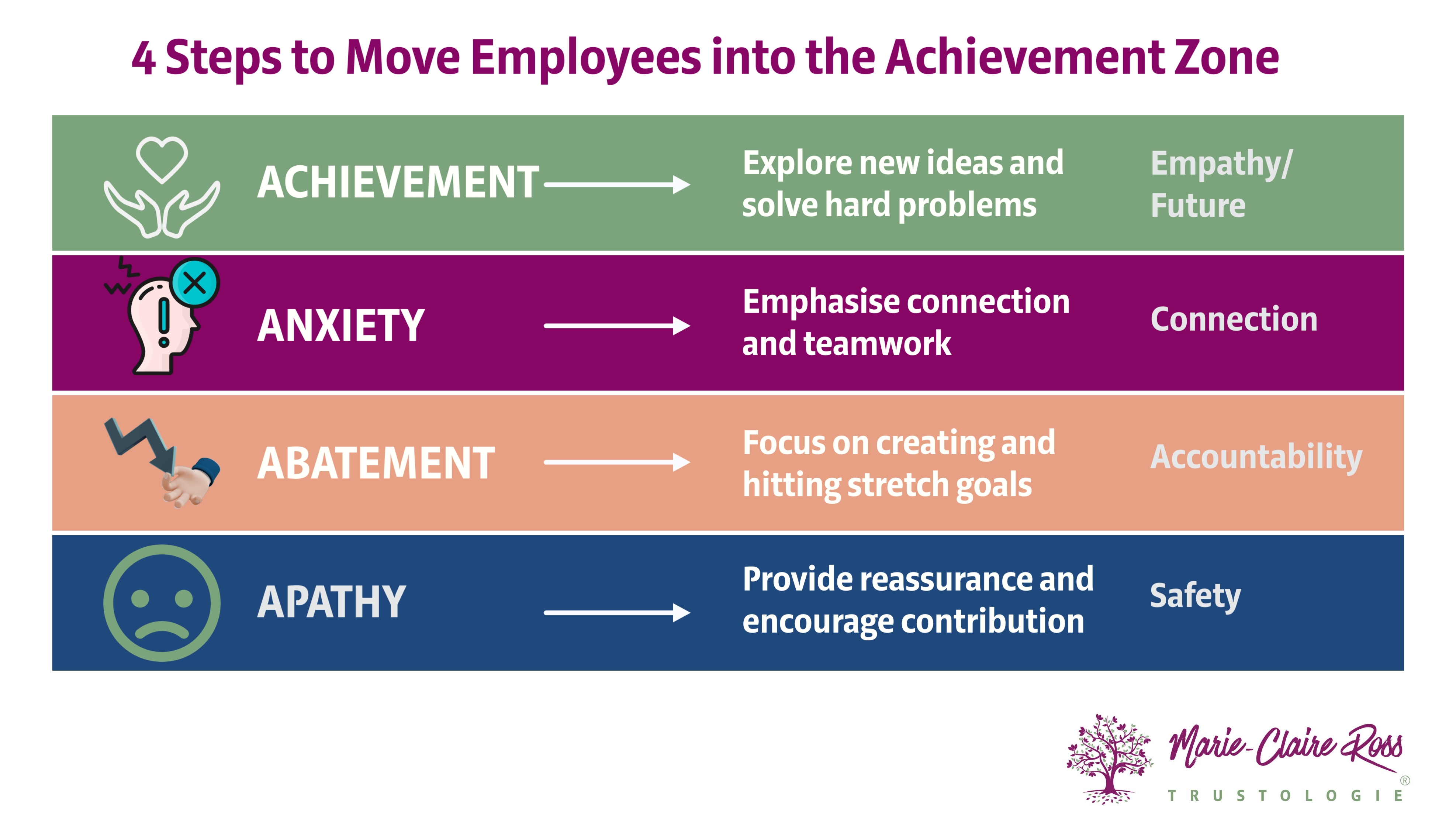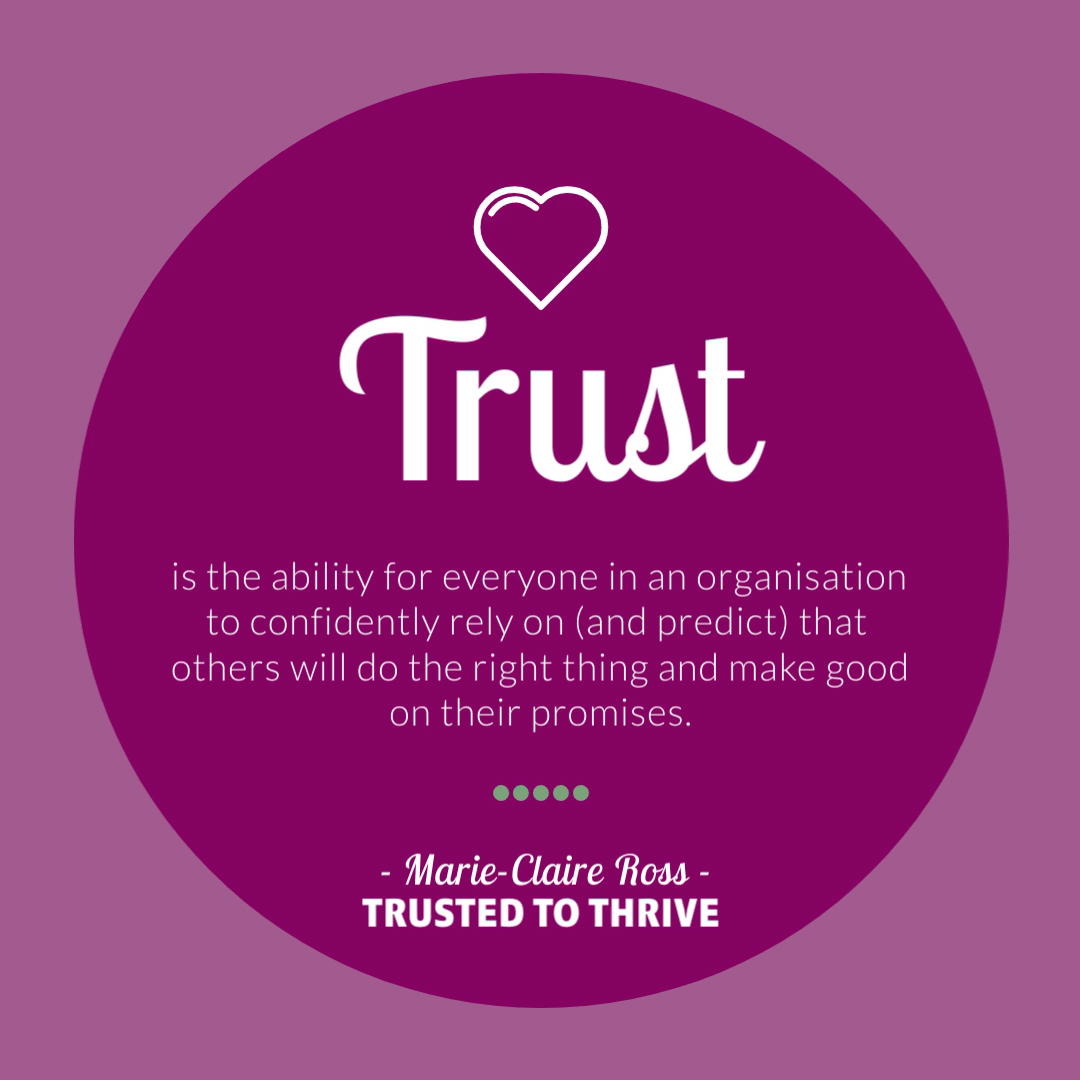11 min read
4 Practical Strategies for Better Emotional Management in the Workplace
I have a friend who often finds herself at the mercy of her emotions. Recently, she called me to rehash a confrontation she’d had with a group of...
Develop leaders, strengthen executive teams and gain deep insights with assessments designed to accelerate trust and performance.

Transform how your leaders think and perform with keynotes that spark connection, trust and high-performance cultures.

Explore practical tools, thought-leadership and resources to help you build trusted, high-performing teams.

Trustologie® is a leadership development consultancy founded by Marie-Claire Ross, specialising in helping executives and managers build high-trust, high-performing teams.


A common misperception of being a great leader is that you have to be a good person. A nice person.
So we act interested in our people, we don't say anything that could upset anyone, we smile a lot and we talk about non-controversial topics.
Without realising it, we become really bland. A leader who has no real opinions and just tries to please everyone.
Although kind and nice may appear similar in meaning, there are fundamental distinctions between the two.
Research has found that kind leadership is characterised by fostering a culture of actively assisting others, addressing poor behaviours in an empathetic manner, actively listening to concerns and taking action to improve work conditions. Kindness stems from a strong sense of self-worth and garners respect in response. Kind leaders are strong in their conviction and strategic focus. They know what needs to be done and they stand firm in achieving the best results. They hold everyone to those high standards and because they are consistent and positive, they earn people's trust with ease.
On the other hand, niceness often revolves around the desire to satisfy others and maintain politeness in order to avoid causing offence. It means constantly adapting your behaviour to please others. Actions and behaviours are performative and designed to manage a 'nice' reputation.
Being nice stems from a constant need for validation, which unfortunately can expose individuals to mistreatment, being exploited or creating a toxic work environment. It means they don't 'see' poor behaviours and turn a blind eye.
While being "nice" may involve offering sympathies when someone expresses personal issues, kindness goes beyond mere listening. It entails taking proactive measures to enhance their situation. Compassionate action is taken to reduce workloads or provide time-off demonstrating a genuine effort to support people's well-being.
Being nice is also pretty exhausting. You are going to be on the path to burnout, if you focus your attention on what others think of you. After all, you have no control of other people's opinions. Trying to control it is a waste of time.
This means that a nice leader often struggles to have a difficult conversation with an employee whose performance needs improvement. A leader who focuses on being nice will often avoid any sort of confrontation that makes them 'not nice.'
Yet, letting a person know their behaviour needs to improve is much nicer for them long-term, as they can rectify the situation. Rather than continue to perform at a lower level and frustrate everyone else around them.
When leaders avoid an uncomfortable conversation because it make them feel uncomfortable, it increases the chance that their team will disrespect them for not having the courage to do the right thing. It gives everyone in the team license to underperform.
Focusing on being kind and doing high quality work garners respect.
And being respected is more important than being liked.
Over the years, I've interviewed lots of employees about their boss. While many of them might not have liked their boss, nor wanted to hang out with them, there were many who said they respected their boss. It was because they knew he was focused on doing the right thing. That he was focused on the best results for clients. And because of that focus they knew that his directives or comments were not personal, but in relation to doing high quality work. They knew they could trust him to do things well and he would challenge their abilities. And for that - respect was given.
At the same time, these employees wanted their boss to respect them in return.
Being nice wastes time
Instead of wasting valuable time worrying about whether your coworkers like you or how to make them like you, focus on what truly matters – getting high quality work done and cultivating strong working relationships.
Recently, I was coaching one of my leaders who started my leadership mastermind program earlier this year. Let's call her Mia. Her CEO had recently let me know that Mia's ability to delegate, empower, inspire and make strategic decisions has improved immensely. To the point that execution of the company strategy had improved significantly, something that no other leader had been able to do before her.
When I spoke to Mia about what had changed it was a combination of "finally getting some genuine leadership tools" and not only learning about her leadership style, but questioning it.
She said "I came into the start of the year being like, oh, to be a good leader, you just have to be a nice person. I'm good at my job and I care about people. But if had I not been doing this leadership course, I'm pretty sure I probably would have had a mental breakdown because I think if I'd kept on just trying to care about everyone and be a good person and do my job, that actually wouldn't have been being a successful leader. I realised it's not just being friends with my team, it's actually helping them find purpose, enjoyment, career development. It's lifting people up. It is actually giving over those tasks. It's having those tricky conversations when you need to. It's saying no. Sometimes it does feel like, being the bad guy, but not in a malicious way. I think that I think I would have really, really struggled with some of the largest strategic decisions that I've had to make if I was trying to be everything to everyone."
Mia is right. Kind-hearted individuals possess the bravery to express their opinions honestly and respectfully, even if their words may not be deemed "nice" by others. They have the courage to be the "bad guy."
If you are trapped in the cycle of being nice and working hard to please everyone around you, you will not be leading authentically. If anything you will be feeling resentful about your overflowing workload, team mates who seem to walk all over you and your inability to put time towards strategy or planning.
If that is you, ask yourself: What impact does my niceness have on the team?
If you find that your need to manage your reputation is more important than doing good quality work, then it's time to refresh you mindset about leadership.
If you want some help with that, get on the waitlist for my Leadership Mastermind which will be starting up again in February next year.

11 min read
I have a friend who often finds herself at the mercy of her emotions. Recently, she called me to rehash a confrontation she’d had with a group of...

9 min read
True leadership presence isn’t a performance or a set of charisma hacks; it is the felt experience of who you are being in the room. By cultivating...

13 min read
As teams return from their summer (or winter) break, you may notice subtle shifts in your team’s energy. Even if the end of year was positive, a new...

Trust may be a small word, but it is incredibly complex. It means different things to different people. How we see trust is based on our life...

One of the interesting things I find when it comes to safety is that some safety professionals (some, not all) like to play bad cop when it comes to...

Getting new starters up to speed as quickly possible should be the goal of every company. Yet, sadly, most companies tend to induct new starters...